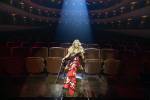Andrea Bocelli on Las Vegas, kids and Aristotle
Andre Bocelli loves Las Vegas so much, he recorded one of his DVDs here. He is back in Vegas to launch his new tour, Saturday at the MGM Grand Garden Arena.
Bocelli is always generous and emotionally intellectual in interviews with me, and this new Q&A was no different.
Elfman: You have been taking your daughter, Virginia, on stage lately. That’s super cute. How young were you the first time you were on stage? Did that young experience excite you for stardom?
Bocelli: I was not the age of Virginia but I was some years older, when I started to get on my first stage: at home.
The large fireplace in the kitchen was for me a sort of limelight where I used to stand and sing, thus responding to the continuous requests of relatives and friends of my parents.
I really trod the stage when I was about eight years of age, in the course of the recital at the end of the school year: I remember a small wooden stage in the recreation room of the boarding school where I spent my first years of study. Full of anxiety and emotion I sang “’O sole mio.” It was the first real applause outside from my family.
I was still wearing shorts when I was pushed by my uncle to take part in a competition organized by the Caffè Margherita of Viareggio (on the Tuscan Coast). I was 12 years old, I won: it was my first success.
Elfman: What are your hopes for your children?
Bocelli: For the younger generations in general, I hope that they can live in a world without wars, where good wins over evil, where man is able – through medical advances – to defeat pain, where we can peacefully welcome and celebrate that extraordinary gift that is life.
As for my children, in particular I strongly wish that they follow their passions and inclinations. We parents, we will have the task of making fertile the ground on which our children will find their way. The “grownups” will have the task to teach values like altruism, honesty, respect, not so much talking about it at home, but giving their children a good example, in all circumstances. With these ingredients, I hope they will be able to build a bright future following their talents and their own desires.
I hope (and I am reasonably convinced) that my children will continue even in adulthood to be “good people.”
I hope that the values they have absorbed during their growth will accompany them along their life always supported by the gift of faith, a life in respect of the others, following Jesus’ advice and also listening to the voice of their heart.
Elfman: I saw the photo of you on Facebook where you’re playing flute in the photo. How many instruments do you play? What kinds of different moods do different instruments evoke for you.
Bocelli: To play the flute is for me another way to sing! Having spent so many days of my life sitting at the piano (the prince of instruments, surely, but physiologically “sedentary”), I am always excited at the idea of having with me a foundry of sounds that can interact with whatever situation. I take my golden flute everywhere with me. And naturally the choice of the material is not a matter of vanity but of quality of sound. Being a musician and, by nature, a curious person, I think it is natural that I am interested in the various facets of this art. For instance, 30 years ago, I was really good at playing the piano!
I have a certain predisposition that allows me to reach a fair level using many instruments: from the saxophone to the horn, from the accordion, to the drums. As for the mood, every instrument can express a range of emotions. Among all, the piano is the most faithful companion and to him, without any hesitations, speaks my inner voice.
Elfman: Music is always referred to as a universal language, yet music still has not completely healed the world. Do you have any wisdom to share about how people can use music to unite, or heal, or empower?
Bocelli: “Music can change the moral character of the soul,” said Aristotle, the great philosopher of ancient Greece, saying that the young should be educated to this art and should practice it. And among all the arts, music is the one that I like best, because it is mysterious, because it brings strong emotions, because it moves along paths that penetrate the most intimate spheres of our psyche, without being ever altered by prejudices or biases. Good music also brings along a strong message of peace and brotherhood; it can educate us to beauty, it can open our heart and mind, and can arouse in us a contemplative desire.
Elfman: Your new album is “Opera — The Ultimate Collection.” Isn’t it daunting to put out an ultimate collection, because how will your next album be, like, “Even Better Than The Ultimate Collection?”
Bocelli: There is always the hope of improving. I pick your question as a wish! In the title of the album we wanted to refer to the result, partial of course, of a career. After 20 years of stage, I wanted put together in a single album a kind of compendium of my sensitivity as an interpreter. I cannot give an evaluation on my contribution, but I can say that I am very proud to have had next to me prestigious orchestras, podiums and colleagues who have given birth to such wonder. Conductors like Zubin Mehta, Valery Gergiev and many others. Colleagues like Barbara Frittoli and Bryn Terfel. Giants in the field of music, with whom I have had the honor of sharing many exciting operatic adventures in these years.
Elfman: I have enjoyed your videos, where you explain the meanings of great opera songs. But I’m curious; do you have a favorite rhythm or instrument? For instance, I am a sucker for waltzes, because I’m a sentimental romantic.
Bocelli: Still talking about opera: Some wind instruments – like the clarinet, but also the flute – are used by great composers to introduce an aria and sometimes to duet, literally, with a singer. And it is always exciting (and you always learn something) to mix your voice with the voice of these instruments. As to the rhythm, I agree with your predilection: I too I love the ternary rhythm of waltz, which can be slow, languid and seductive but also festive and pleasure-seeking, but also impassioned and even threatening.
Elfman: Does anyone ever make you envious of their skills, like a musician, or a politician, or a writer?
Bocelli: More than envy, I would speak of admiration. There are lots of musicians and writers for whom I have the greatest admiration. A bit less for politicians, but also among them there are many valuable people.
Elfman: Is there anything else you want to tell the people of Vegas? Do you want them to bring you a gift, or an attitude?
Bocelli: I would like to let these people have my warmest embrace and my dearest greetings. Every time I get back to Las Vegas, I feel as if I were recharging my batteries, I feel an energy that makes this place absolutely unique. Perhaps I am running the risk of repeating myself, but I want to reiterate what a great gratitude I feel for this public that has followed me, with an extraordinary affection, for many years. When I sing in Las Vegas, I know I will have in front of me, a generous public: people who know how to have fun and how to express and share their emotions. This is why, from the emotional point of view, I feel your fellow citizen.






























